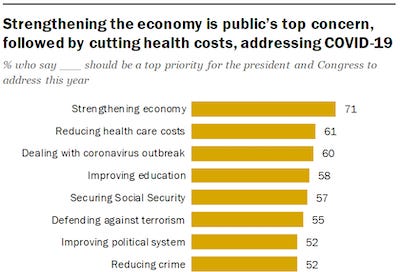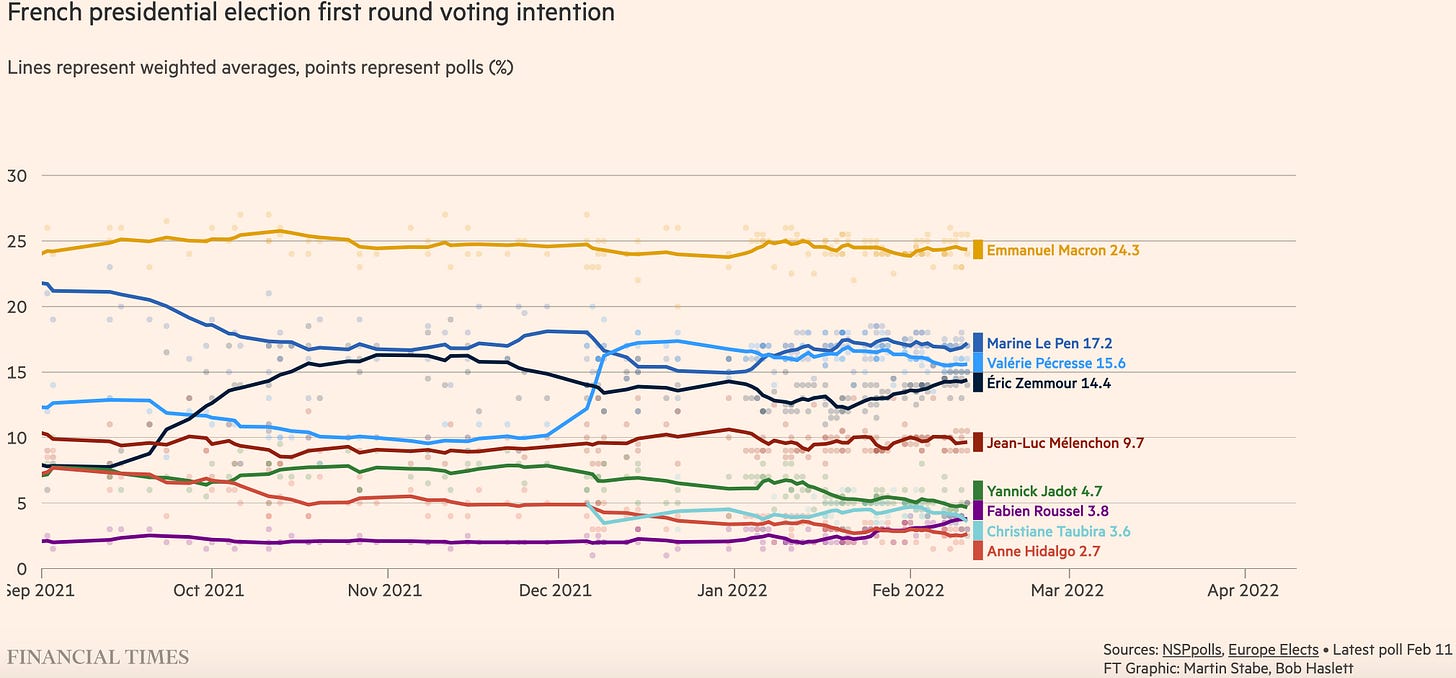Today’s posts that caught my eye:
From the WaPo: “The facial recognition company Clearview AI is telling investors it is on track to have 100 billion facial photos in its database within a year, enough to ensure “almost everyone in the world will be identifiable,” according to a financial presentation from December obtained by The Washington Post. Those images — equivalent to 14 photos for each of the 7 billion people on Earth — would help power a surveillance system that has been used for arrests and criminal investigations by thousands of law enforcement and government agencies around the world. And the company wants to expand beyond scanning faces for the police, saying in the presentation that it could monitor “gig economy” workers and is researching a number of new technologies that could identify someone based on how they walk, detect their location from a photo or scan their fingerprints from afar.”
59% of U.S. workers who say their jobs can mainly be done from home are working from home all or most of the time — much higher than the 23% who say they teleworked frequently before the coronavirus outbreak, Pew Research Center reports.
But the new generation wants back to the office: “Only 2% of college seniors actually want to work remotely full-time, according to iCIMS’ Class of 2021 report. Most want at least some in-person interaction,” Protocol notes.
Know someone who should check out the newsletter? Let them!
The World
Public’s top priority for 2022: Strengthening the nation’s economy. As the pandemic enters its third year, more Americans view strengthening the U.S. economy as a top policy priority than say the same about dealing with COVID-19. This marks a shift from last year, when the economy and the coronavirus both topped the public’s policy agenda. 71% of U.S. adults rate strengthening the economy as a top policy priority, followed by reducing health care costs (61%), addressing the coronavirus (60%), improving education (58%) and securing Social Security (57%). (Pew Research Center)
Federal Reserve officials are set to raise interest rates next month and would be willing to tighten monetary policy more quickly than they currently anticipate if US inflation does not come under control, according to the minutes of their latest meeting. The account of the January gathering of the Federal Open Market Committee said officials were on board for the first interest rate increase since 2018 to be implemented “soon” in the face of soaring inflation. Economists interpreted that to be a confirmation of a “lift-off” in March. Most Fed officials acknowledged that a faster pace of rate rises was “likely warranted” compared to the last tightening cycle. (Financial Times)
U.S. retail sales surged 3.8% from December to January as shoppers spent strongly at the start of the year with a surge in big-ticket and online purchases as inflation reached a 40-year high and the Omicron wave began to recede. This marks the strongest monthly gain since March 2021. (Wall Street Journal)
The U.S. accused Russia of lying about pulling back troops from Ukraine’s borders, saying that Moscow has added more than 7,000 combatants in recent days, and that there was fresh evidence it was mobilizing for war. The claim, by a senior administration official, came as other Western allies expressed similar doubts that Russia was backing away from a military confrontation. The senior Biden administration official, who spoke on the condition of anonymity to discuss recent intelligence findings, said intelligence officials have confirmed that the troop increase continued, after President Vladimir V. Putin of Russia declared that with exercises over, some troops were returning to barracks. (New York Times)
Fewer people say they are out of work for reasons having to do with Covid-19, a sign that the labor market impact of the Omicron variant of the virus could be receding. New Census Bureau data show that the number of people who were out of work because they were sick or caring for someone who was sick fell to 7.8 million in late January and early February, down from almost 8.8 million in early January. But the number of people calling in sick remains higher than at almost any other time since the beginning of the pandemic, echoing the record surge in new infections last month because of the Omicron variant. (Wall Street Journal)
NYC Mayor Eric Adams is urging leaders of major companies to lift COVID-19 restrictions and allow employees to return to offices in the city. It's part of Adams' effort to jumpstart the city's economy as Omicron cases slow. "Now is the time for us to get back," Adams said. "I’m hoping within the next few weeks, the CEOs map out a real plan of 'this is when you need to come back.'" (Axios)
Singapore gears up for wider reopening despite record COVID cases. (Nikkei Asia Review)
The rift in the EU deepened after its highest court ruled that Hungary and Poland could lose funding worth more than €100 billion for failing to abide by its core values. Judges at the European Court of Justice ruled that Brussels could withhold funds to member states seen to be violating the law on judicial independence, migrant quotas and LGBT rights. (The Times)
France will vote over two rounds in April on whether to give President Emmanuel Macron a second five-year term or entrust a different candidate with the presidency in an unpredictable election that could mark a shift to the right in French politics. The first round of voting, which includes all candidates who get enough signatures to run, takes place on April 10. The two contenders with the most votes will then face a showdown on April 24. Based on the latest polls, Macron will be one of those in the run-off, but the other place looks up for grabs. (Financial Times)
The facial recognition company Clearview AI is telling investors it is on track to have 100 billion facial photos in its database within a year, enough to ensure “almost everyone in the world will be identifiable,” according to a financial presentation from December obtained by The Washington Post. Those images — equivalent to 14 photos for each of the 7 billion people on Earth — would help power a surveillance system that has been used for arrests and criminal investigations by thousands of law enforcement and government agencies around the world. And the company wants to expand beyond scanning faces for the police, saying in the presentation that it could monitor “gig economy” workers and is researching a number of new technologies that could identify someone based on how they walk, detect their location from a photo or scan their fingerprints from afar. (Washington Post)
Mergers of private contractors hurt both national security and the economy, a new report from the Department of Defense suggests. Three sources account for 90% of U.S. missiles, amongst other examples. (Associated Press)
Jim Clyburn saved Biden’s candidacy — and now has the president’s ear on Supreme Court picks. The South Carolina lawmaker has tremendous influence in the White House, and he has made clear he wants the president to nominate U.S. District Judge J. Michelle Childs to the Supreme Court. (Washington Post)
Conservatives open new front in the elite school admission wars: The Pacific Legal Foundation is behind lawsuits that challenge elite public high schools that are changing their admissions policies to diversify their student body. When school started last fall at one of the nation’s most competitive and prestigious public high schools, the incoming freshman class looked different by design. Compared with previous classes at Thomas Jefferson High School for Science and Technology in Alexandria, Va., there were more Black and Hispanic students, as well as white students — but fewer Asian students. That is because standardized testing that had once been the key to admission was eliminated. Top students were admitted from a cross-section of schools, and weight was given to poorer students, as well as to students learning the English language. (New York Times)
Eric Adams proposes a $98 billion budget with no cuts for N.Y.P.D. The mayor’s first budget proposal called for across-the-board cuts to most city agencies, as well as a reduction in the city’s work force. (New York Times)
Sen. Dianne Feinstein ’s approval ratings have plummeted to unprecedented lows as California voters turn against their senior senator, according to a new poll from the Berkeley Institute of Governmental Studies. Voters disapproved of Feinstein’s job performance by an enormous 19-point margin. Her standing has steadily eroded, with her approval rating — now at just 30% — dropping 5 points since May. She does not command majority approval among Democrats, topping out at 45%, and she has lost the left, with Democrats who consider themselves “strongly liberal” more likely to disapprove by 5 points. (Politico)
Economy
Keep reading with a 7-day free trial
Subscribe to Chris Riback's Newsletter to keep reading this post and get 7 days of free access to the full post archives.




